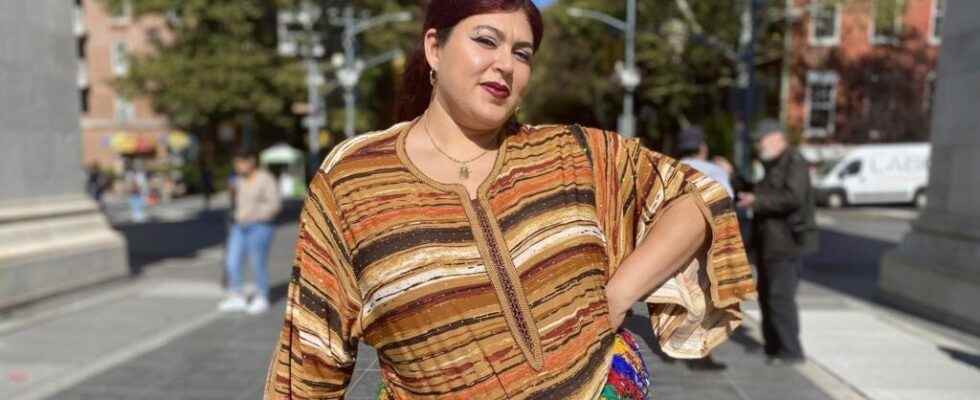The BBC ranked her among the 100 women who inspire the most others in the world in 2022. At 29, Esraa Warda, American of Algerian origin, uses dance to promote popular music from North Africa and defend the place of women in this cultural heritage.
From our correspondent in New York,
When she opens the door to her Brooklyn apartment, Esraa Warda greets us with a broad smile and boundless energy. She has just returned from her tour. ” I came back a week agoshe says, but I didn’t leave my house! I was exhausted! “And there is what! In the space of a month, the dancer has chained twenty shows and festivals in the United States, Morocco and France.
To thank us for coming to her house, Esraa insists on serving us tea, in a cup ” brought from Morocco “. Moreover, everything in his apartment comes from North Africa: the carpet, the cushions, the blankets and even the tables… “ I wanted to feel at home, like at home! “, she confides.
Putting North Africa in the spotlight is her daily goal, at home and on stage.
Birth of a passion
Esraa Warda was born in New York to Algerian parents. She grew up in the Arab and immigrant community of Brooklyn. She remembers that it was during her first trip to Algeria, at age 11, that she discovered her passion for dance. She and her mother were invited to a wedding. ” I think the very first time I danced was to raï, in my uncle’s living room “, recalls Esraa, before adding with humor: “ I had no idea what I was doing. “But of these moments shared with her Algerian family, she keeps” the feeling of belonging that dance offers » and above all, she « integrates the fact that the traditional dances of his country are practiced in the family setting “.
For years, it was therefore only during celebrations that Esraa let loose to the rhythms of popular Algerian or Moroccan songs. Despite her passion for these dances, she puts her talent aside.
Her parents push her to pursue a traditional course. She will therefore go to university to earn a degree in political science and women’s studies. Until the day when young girls from the cultural center where she works ask her to teach them. ” I never thought I would teach dance! “, she confides. “ I think it’s a bit of a legacy of colonization. We end up thinking that our cultural heritage is not worthy of being an art. »
From the family living room to the stage
The first dance workshops organized by Warda were an immediate success. ” I had to create a learning method and codes based on my references and what I learned from my family. »
With his students, Warda wants to promote North African dances, “ not to be confused with belly dancing “. Here, it is mainly movements of the pelvis and the feet, unlike the more languorous oriental dance, which also uses ample movements of the arms and upper body.
Curious, Esraa tells herself that she cannot teach dance without having complete mastery of it. This is how she decides to go to the source. Direction Morocco and Algeria to meet the chikhates, popular singers and dancers. ” I learned so many things about the history of popular arts, raï, chaâbi, Algiers, chaoui… », explains Warda who collaborates regularly with Cheikha Rabiaone of the last traditional Algerian raï singers.
During one of her many trips to Morocco, the dancer met Khadija El Warzazia. The founder of Bnate El Houwariyate, a very popular women’s group in Marrakech, takes Warda under her wing. With her, the New Yorker perfected her art. ” learning by transmission », an essential element for the dancer. ” These women are the last guardians of these vanishing traditions “, she explains.
A collaboration, or an artistic alchemy which recently earned them an appearance on the prestigious show Tiny Desk Concerts of the American public radio NPR.
The militant dance
Today, Esraa Warda is regularly invited by universities to talk about North African dances and traditions. When she is on stage, she knows that beyond the show, it is part of the history of her ancestors that the movements of her body symbolize.
An assumed feminist, Esraa Warda also has another mission: “ Dance is a middle finger to the patriarchy “Launches the artist before asking with a smile if she can use the expression in an interview.
For her, dance break the rules ” And ” allows women to take control of their bodies in the public space “.
Through her workshops, which she always organizes between two trips, Esraa also wants to create a free space for all people who feel marginalized by society, such as the LGBTQ community.
